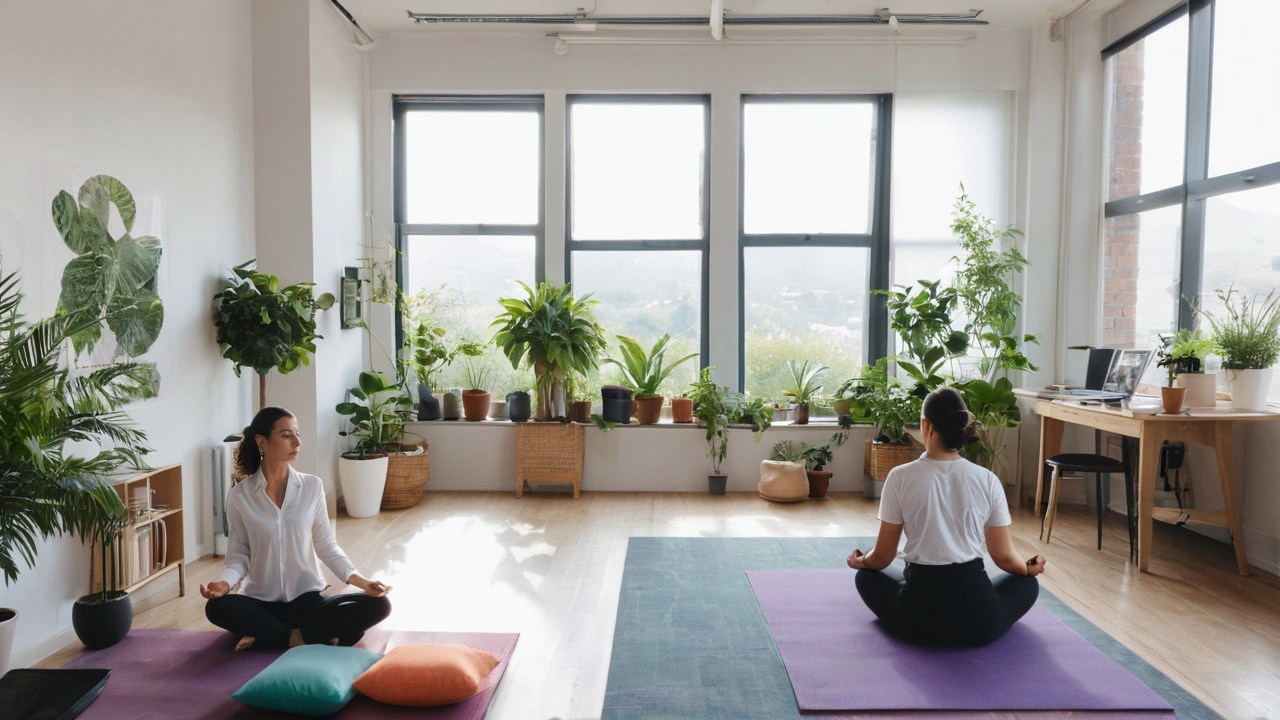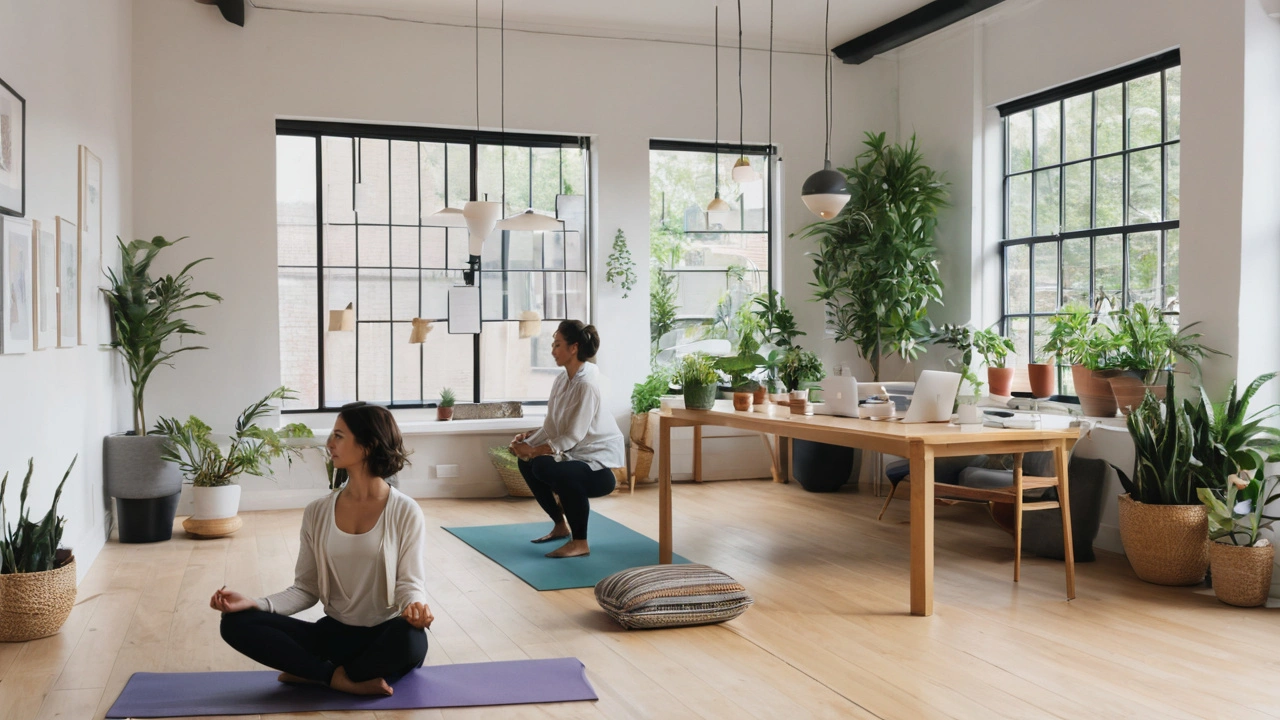In today's fast-paced world, stress can feel inevitable. We juggle multiple responsibilities, meet deadlines, and try to maintain a social life — all while staying fit and healthy. But stress doesn't have to take over. Incorporating a few stress-busting habits into your daily routine can make a world of difference.
Deep Breathing Exercises
One of the simplest and most effective ways to combat stress is through deep breathing exercises. These exercises are particularly beneficial because they can be performed almost anywhere and require no special equipment. By focusing on your breath, you can promote relaxation and reduce the levels of stress hormones in your body.
An excellent technique to start with is called the 4-7-8 breathing method. This approach is designed to help you relax quickly by regulating your breath. Here's how you do it:
- Find a comfortable seating position. Sit with your back straight and your feet flat on the floor.
- Inhale quietly through your nose for a count of four seconds.
- Hold your breath for a count of seven seconds.
- Exhale completely through your mouth for a count of eight seconds.
- Repeat this cycle for three to four times, or until you feel calmer.
According to a study published in the journal Frontiers in Psychology, deep breathing exercises can significantly lower cortisol levels, the hormone associated with stress. Lower cortisol levels mean you’re likely to feel more relaxed and in control. Another benefit is that deep breathing can improve your focus and mental clarity. The technique increases the oxygen supply to the brain and helps boost cognitive function.
Dr. Mladen Golubic, a physician at the Cleveland Clinic, says,
"Deep breathing is a powerful tool to combat stress effectively. It's simple to learn and easy to incorporate into a daily routine."
If you're skeptical, try giving it a go during a moment of high stress, like before a big meeting or an important call. You might find that you feel more grounded and prepared. Breathing slowly and deeply signals to your brain that it's time to calm down, activating your body's relaxation response.
You can also enhance the experience by combining deep breathing with visualization. Picture a place where you feel most at ease—maybe a tranquil beach or a serene forest. Each breath you take, imagine bringing more of that peaceful energy into your body.
Another method to try is box breathing, also known as four-square breathing. This technique is commonly employed by Navy SEALs to remain calm and focused in stressful situations. The steps are as follows:
- Inhale for a count of four.
- Hold your breath for a count of four.
- Exhale for a count of four.
- Hold your breath for a count of four.
Repeat the cycle for a few minutes. This type of breathing can help regulate your nervous system, reducing the physical symptoms of stress. It is a handy resource for those who often find themselves in high-pressure environments.
Deep breathing offers a quick and reliable way to manage stress, making it a valuable tool for anyone with a busy schedule. Consistency is key, so integrate it into your daily routine to reap its full benefits. Whether it’s before bed, during breaks, or even while commuting, a few minutes of deep breathing can make a big difference.

Quick Physical Activities
Even if your schedule is jam-packed, squeezing in some physical activities can offer immense stress relief. Exercise releases endorphins, the body's natural mood boosters. You don't need a lengthy, intense workout to reap the benefits. Even brief periods of movement can have a significant impact on your mental well-being. A study by the Mayo Clinic found that just 10 minutes of brisk walking can improve mood and reduce anxiety.
Try incorporating short bursts of activity into your day. For instance, if you work at a desk, take a five-minute break every hour to stretch or walk around. This can help reduce muscle tension and improve circulation, making you feel more energized and less stressed.
Another option is to use your lunch break efficiently. A quick 15-minute walk around the block, or even a few laps up and down the stairs, can invigorate you for the rest of the afternoon. If walking isn't possible, desk stretches or chair yoga can be beneficial. You can perform simple stretches such as neck rolls, shoulder shrugs, or seated twists to alleviate tension in your upper body.
"Movement is a medicine for creating change in a person's physical, emotional, and mental states," says Carol Welch, a renowned fitness expert. Incorporating physical activities into your daily routine doesn't require special equipment or a gym membership, making it accessible for everyone.Consider activities like dancing, which can be done in the comfort of your home. Put on your favorite song and dance for a few minutes. It's a fun way to get your heart rate up and release built-up tension.
If you prefer a structured approach, there are many apps and online platforms that offer short exercise routines. Many of these programs are designed for busy people, providing quick workouts that can be done in 10-15 minutes. Options include high-intensity interval training (HIIT), quick yoga sessions, or pilates.
Incorporating these mini-workouts can help you stay active without disrupting your schedule. Making exercise a regular part of your routine can not only reduce stress but also improve overall health and productivity.

Mindfulness Moments
Mindfulness is a powerful tool for stress reduction, especially for those constantly on the go. It's about being present and fully engaged with the here and now, without judgment. Research from Harvard University suggests that mindfulness can help reduce stress, lower blood pressure, and improve focus and emotional regulation. It can be practiced anywhere, anytime, and it doesn't require any special equipment or hours of commitment.
One simple way to incorporate mindfulness into your daily routine is through a practice called the “3-Minute Breathing Space”. Start by taking a minute to sit comfortably and focus on how you're feeling. Without trying to change anything, just observe your thoughts and emotions. In the second minute, shift your attention to your breath. Notice the sensation of air entering and leaving your body. In the final minute, expand your awareness to your body as a whole, feeling grounded and present. This quick exercise can help you reset during a busy day and is especially useful before starting a new task.
Engaging in mindful eating can also be remarkably beneficial. Instead of rushing through meals, take the time to savor each bite. Notice the flavors, textures, and aromas of your food. This practice not only helps in reducing stress but also in improving digestion and enjoying food more fully. A study published in the journal Appetite found that mindful eating can significantly lower levels of the stress hormone cortisol.
“Mindfulness gives us a way to be fully present in each moment, which is where true peace and happiness reside.” — Deepak Chopra
Another effective method is practicing a mindfulness meditation called the Body Scan. This involves lying down or sitting comfortably and mentally scanning through different parts of your body. Start at your toes and slowly move up to your head, paying close attention to any sensations you feel. If your mind wanders, gently bring it back to the part of your body you're focusing on. The Body Scan can be done in as little as five minutes and is a great way to unwind before bed.
Lastly, incorporate nature into your day whenever possible. Spending even a few minutes in green spaces has been shown to reduce stress and improve mental health. If you're stuck in the office, try to take short breaks outside or bring nature indoors with plants. A study conducted by the University of Exeter found that employees with plants in their workspace reported higher levels of productivity and lower levels of stress and fatigue.

Healthy Nutrition Choices
What we eat has a massive impact on how we feel. A common misconception is that eating healthy is time-consuming and complicated. But with a little planning, you can make nutritious choices that actually save time in the long run. Many people don’t realize that their diet directly affects their stress levels. Foods rich in vitamins and minerals can boost mood and help manage stress more effectively.
Starting your day with a balanced breakfast can set the tone for the hours ahead. Incorporating whole grains, fruits, and proteins like yogurt or eggs helps maintain energy levels and keeps your mind sharp. Skip sugary cereals and pastries because the sugar crash can make you feel more tired and stressed out. Instead, opt for oatmeal topped with fresh berries or a smoothie packed with veggies and protein powder. Simple swaps like these make a big difference.
Hydration is another key factor. Dehydration can amplify feelings of anxiety and stress. Aim to drink at least eight glasses of water a day. Carry a reusable water bottle to remind yourself to drink throughout the day. Herbal teas, such as chamomile or peppermint, can also be soothing and effective for stress relief. They count towards your daily intake too.
Midday snacks are crucial for keeping stress at bay. Swap out junk food for snacks that provide sustained energy. Nuts, seeds, and fruits are excellent choices. They are not only convenient but also filled with essential nutrients. Dark chocolate is another good option; it’s rich in antioxidants and can boost your mood when consumed in moderation.
Meals high in omega-3 fatty acids have been shown to reduce symptoms of anxiety. Fish like salmon and mackerel, flaxseeds, and walnuts are good sources. Including these in your diet can go a long way in managing stress. Healthy fats from avocados and olive oil are also beneficial and can easily be added to salads or used in cooking.
“Stress directly impacts our nutritional choices, which in turn can influence stress levels,” says Dr. Elizabeth Scott, a wellness coach and author.
Avoiding excessive caffeine and alcohol is important. While a cup of coffee can provide an energy boost, too much can lead to jitters and increased stress. Try to limit your caffeine intake to one or two cups per day and avoid caffeinated drinks in the afternoon. As for alcohol, while it might seem to relieve stress in the short term, it interferes with sleep and can leave you feeling more stressed the next day.
Planning and prepping meals ahead of time can save you from making poor nutritional choices when you’re in a rush. Spend some time on weekends cooking large batches of healthy meals that you can freeze and reheat during the week. This way, you always have a nutritious option available, even on your busiest days. Invest in some good storage containers to make this process easier.

